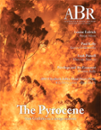 4331787235526311961.jpg
4331787235526311961.jpg
 4331787235526311961.jpg
4331787235526311961.jpg
'Welcome to the fiery March 2020 issue of ABR! Our cover features a luminous, shocking photo from the New South Wales bushfires. Award-winning historian Tom Griffiths writes about this ‘season of reckoning’ during which we saw ‘the best and worst of Australia: the instinctive strength of bush communities and the manipulative malevolence of fossil-fuelled politicians’. Elsewhere, Dominic Kelly writes about privilege and The Economist; Yves Rees reviews several trans memoirs; and we have reviews of new novels by Louise Erdrich, Anne Enright, Philip Pullman, Evie Wyld, and Catherine Noske.' (Introduction)
'At the beginning of this wide-ranging collection of criticism by the novelist, critic, and academic Anthony Macris, the author notes wryly that an early candidate for the book’s title was Personality Crisis, such is its diversity of topics and styles. The implication here is that reviews and essays form a kind of autobiography. I’m not sure I would use the word ‘crisis’ to describe it, but certainly the portrait we have in this case is of a writer driven by very different kinds of curiosity: about literature and writing but also the art forms that lie beyond them – and, as centrally, by a social and political curiosity about the ways those forms change when they respond to the world around us.' (Introduction)
'Leah Purcell has described how her lifelong fascination with Henry Lawson’s iconic 1892 short story provided her with abundant creative ammunition. Her mother read her the story when she was five; it held a special place for them both. ‘I’d say the famous last line: “Ma, I won’t never go drovin ... she’d tear up”.’' (Publication summary)
'Three recent début novels employ the genre of the Bildungsroman to explore the complexities of female experience in the recent historical past.'
'To some it may seem solipsistic to be reviewing what is, in effect, a collection of reviews, but when the reviewer in question is as smart as the late Clive James and the subject is as substantial as Philip Larkin (1922–85) this is unlikely to be the case.' (Introduction)
'The assertion that ‘love is strong as death’ comes from the Song of Solomon, a swooning paean to sexual love that those unfamiliar with the Old Testament might be startled to find there. Songwriter and musician Paul Kelly has included it in this hefty, eclectic, and beautifully produced anthology of poetry, which has ‘meaningful gift’ written all over it. ' (Introduction)
'W.H. Auden once rebuked Percy Shelley for characterising poets as ‘the unacknowledged legislators of the world’. To think this way is to confuse hard with soft power, coercion with persuasion. Poetry, as Auden famously wrote, ‘makes nothing happen’; he instead bestowed Shelley’s epithet upon ‘the secret police’. But in an age of surveillance and information warfare that has militarised the channels of everyday communication, the line between hard and soft becomes more difficult to draw. The very notion of a random or innocent signal seems laughably naïve as we are inundated by new suspicions and suspicions of news. But the state of mind in which there is always more meaning to be had is one that poetry invites us to inhabit. For Shelley, poems were ‘hieroglyphs’ and the poetic imagination an ‘imperial faculty, whose throne is curtained within the invisible nature of man’. Is the poet an agent, then, of this secretive control? Perhaps Shelley was on Auden’s side all along.' (Introduction)